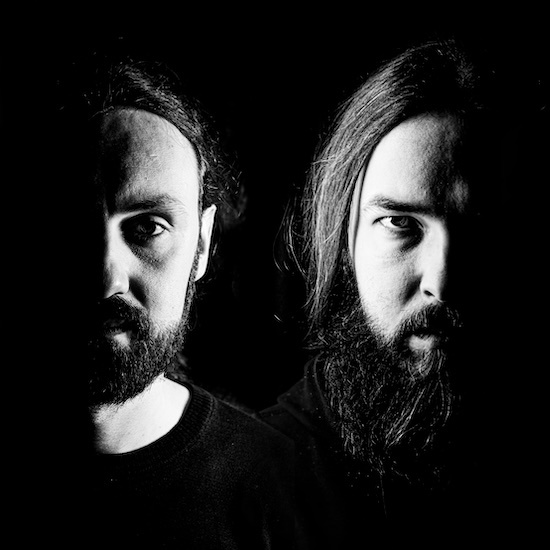
(written by Islander)
Funeral doom is a venerable but narrow musical niche, now old enough to be well-established and highly regarded by its adherents, but many caverns below anything that would pass as “popular”, even among most fans of extreme metal.
The signature tropes of the sub-genre are by now well-known: long song-lengths, glacial pacing, abyssal atmospheres of sprawling scale, often titanic heaviness, often monstrous vocals equally abyssal in depth. Of course there are variations: trappings of spectral elegance and haunting beauty; singing instead of growling; the occasional roaring upheavals instead of the slow, quaking pace of massed mourners or wounded giants. Sometimes you might even hear whispers of hope, like tiny moths drawn to a candle that will be found dead by morning.
Where does the Polish funeral doom band Postmortal fit within this old and deep but narrow musical crevasse? Early signs appeared in their Soil EP in 2018, but the lineup has changed since then, diminishing to the duo of lyricist/vocalist Dawid Dunikowski and musician Michał Skupień. Current signs are available in the debut album made by these two, Profundis Omnis, which re-states some of the band’s early compositions and is now set for release on May 9th by the UK label Aesthetic Death.

What we have for you today is the premiere of a song from the album named “Decay of Paradise“. It both conforms to and subtly separates itself from many of the old tropes.
Its rhythmless overture combines the subdued heaviness of distant thunder and the ephemeral but chilling shimmers of distant stars, and a woman wordlessly wails, part-mourner and part-ghost over whom she grieves. When the guitar arrives in mangled chiming tones, it too seems grieving. When the beats come, they slowly boom and sharply pop, slow-motion mortars and guns.
The reverberating chords moan in agony (no hope here), and the main vocals well up from trenches, jagged and deep, near-garroted and gurgling, as slow-moving as the beats. But those high spectral vocals and celestial audio shimmers continue arriving, chilling the skin with every supernatural appearance.
No sudden upheavals here, but variations in the riffing that ooze other more desperate agonies and shrill ringing and quivering tones that seem wondrously to beckon, or to warn like sirens; they contrast with the music’s crushing blows and depth-charge chords.
The effect of all this is hypnotic, like a waking dream, profoundly eerie and yet still an earth-shaker, a convocation of giants and wraiths, of sensations cavernous and celestial.
Here is what Postmortal have said about the song:
As every second brings us closer to death, “Decay of Paradise” will take you one step further to the Profundis Omnis album. Haunting voices of the past and corruption of mind brings us to the edge of reality. We will show you death and despair, broken hope and a little bit of lust. After a few years of stagnation, Postmortal wants to show you our pit of doom and take you for a slow and heavy ride.
As befits funeral doom, the song is characterized by slow tempo and heaviness. The characteristic element here is the female vocal in the form of a simple repeating sequence. It appears only in this song on the entire album. The song is quite short, but there are quite a few changes in it. Thanks to this, it can be interesting not only for funeral doom veterans but also for people who may not have been interested in this genre at first.
You might be curious about the comment that “Decay of Paradise” is “quite short.” These things are relative, of course. The first song revealed from the album, the opening track “Fallen“, reaches 9 1/2 minutes. Two of the other four climb close to 11 minutes.
At the outset of “Fallen“, the clanging of the bass stands in for the wailing woman, and the growls surface sooner. Its moderately faster pace will also more quickly put listeners into a full-body heave if they’re standing up, and there’s something more sinister, more hallucinatory about the music, including the strange harmony of the singing that eventually rises up and the song’s sudden bursts of bright audio sparkles and woozy warbles.
The ringing lead-guitar patterns that eventually take center stage in “Fallen” are psychedelic in their influences, not a typical feature of funeral doom, chilling yet charismatic in a different way. (I’ve had a really hard time getting them out of my head.) And there are deep rumbling upheavals in this one, as well as demonic snarls and disturbing gasps.
“Fallen” thus stands out in a different and even more startling way than the song we’ve premiered. But the fascinations of both songs, like the album as a whole, signify that it’s unlikely they (or it) will soon be forgotten.
For more info about the album and how to get it, check out the links below. Aesthetic Death recommends it for fans of Thergothon, Tyranny, The Funeral Orchestra, Catacombs, and Evoken.
AESTHETIC DEATH:
https://www.aestheticdeath.com/
https://aestheticdeath.bandcamp.com/
https://www.facebook.com/aestheticdeath.uk
POSTMORTAL:
https://postmortal.bandcamp.com/
https://www.facebook.com/postmortalofficial

No Responses to “AN NCS PREMIERE: POSTMORTAL — “DECAY OF PARADISE””